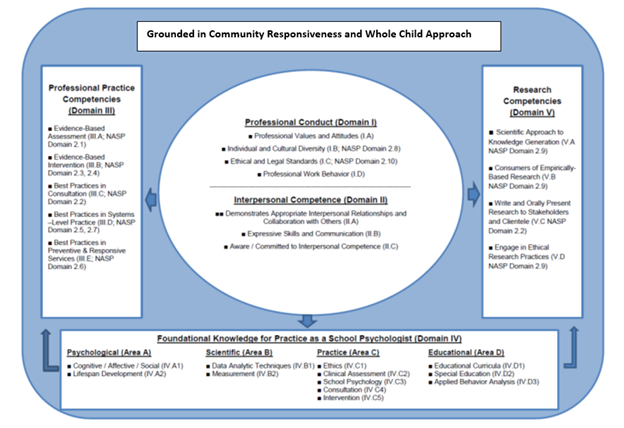College of Education, Department of Educational, School, & Counseling Psychology School Psychology (Ed.S.)
The School Psychology (Ed.S.) program is open for applications. The deadline for 2026 Fall Admission is January 15, 2026.
The Educational Specialist (Ed.S.) in School Psychology is a three-year program with two years of coursework on campus and a yearlong internship. In the Ed.S. program, students typically earn a Master of Science (M.S.) degree after the first year of coursework. The Ed.S. program is fully approved by the National Association of School Psychologists (NASP) and accredited by the Association for Advancing Quality in Educator Preparation (AAQEP).
Graduates of the Ed.S. program are eligible for certification as a school psychologist in the state of Kentucky and should meet certification standards in most other states. Program completion also partially fulfills requirements for certification as a Psychological Associate by the Kentucky Board of Psychology. Applicants who have earned a bachelor’s degree or master’s degree are considered for the program.
Delivery Method: In-person
Department of Educational, School, & Counseling Psychology
Program Philosophy
The Educational Specialist (Ed.S.) in School Psychology is a three-year program with two years of coursework on campus and a yearlong internship. In the Ed.S. program, students typically earn a Master of Science (M.S.) degree after the first year of coursework. The Ed.S. program is fully approved by the National Association of School Psychologists (NASP) and accredited by the Association for Advancing Quality in Educator Preparation (AAQEP).
Graduates of the Ed.S. program are eligible for certification as a school psychologist in the state of Kentucky and should meet certification standards in most other states. Program completion also partially fulfills requirements for certification as a Psychological Associate by the Kentucky Board of Psychology. Applicants who have earned a bachelor’s degree or master’s degree are considered for the program.
Training Model
Our training model, pictured graphically here, consists of five domains that are interrelated and fully grounded in: (a) a commitment to community and structural responsiveness, (b) understanding that various systems affect children’s functioning (e.g., home; school; community), and (c) an advocacy role for psychologists working on behalf of children. Professional Conduct (Domain I) and Interpersonal Competence (Domain II) are emphasized as core components of professional training that impact learning and practice related to professional practice, research competencies, and mastery of foundational knowledge. Within Domain I, the program training model emphasizes the critical roles of developing a professional identity as a psychologist and a lifelong learner, understanding human differences, behaving ethically, exhibiting self-care, and committing to professional work behavior. Within Domain II, the program training model emphasizes the goal to develop students’ interpersonal competence through fostering empathic behavior, engaging in appropriate interpersonal relationships, communicating effectively with others across various settings, and building awareness and commitment to interpersonal competence throughout students’ professional development. The arrows extending from the core reflect program faculty and students’ beliefs that professional conduct and interpersonal competence impact all other aspects of professional training. Within Domain III (Professional Practice Competencies), the program training model reflects a commitment to training students in delivery of professional services with a strong evidentiary base. Within Domain III, the program training model reflects its deep commitment to the scientist-practitioner model within respect to professional practice. Program training emphasizes evidence-based practices in four core professional activities: (a) assessment, (b) intervention, (c) consultation, and (d) supervision. Within Domain IV (Foundational Knowledge), the program training model identifies foundational content critical for professional practice and research. The placement of Domain IV at the base of the training model reflects the program’s belief that science and practice must be grounded in understanding psychological, scientific, practice, and educational foundations and methods of professional psychology. As the arrows indicate, the training model emphasizes that mastery of foundational knowledge undergirds training in both the science and practice of psychology. Within Domain V (Research Competencies), the program training model identifies the program’s commitment to sound research training of its students.
Goals, Objectives, and Competencies
To prepare effective practitioners to work with children, families, schools, and other systems, the faculty has organized specialist training around five main domains. These domains are sub-divided into distinct objectives and competencies subsequently evaluated by a number of student skills or outcomes. These competencies are measured regularly via multiple methods, including but not limited to: curricula, master’s exam; praxis exam; practicum evaluations; case study/portfolio, and internship evaluations. All these components serve a tri-fold purpose:
- to assure that students are meeting competency benchmarks expected of them at their various stages of training;
- to inform student advisement, provide on-going feedback, and extend the faculty-student relationship that will help the student make progress and succeed in the program; and
- to provide data for the faculty as to whether the training students receive in the specialist program is effective in achieving these competencies and to use this information as formative feedback for program monitoring and continual improvement.
Accreditation
The specialist degree program in School Psychology is fully approved by the National Association of School Psychologists (NASP). Questions related to the program’s accredited status should be directed to the NASP Certification Department:
National Association of School Psychologists
4340 East West Highway, Suite 402
Bethesda, MD 20814
Phone: (301) 657-0270 / Email: cert@naspweb.org
Web: http://www.apa.org/ed/accreditation
Program Details
Learn more about:
- Application requirements
- Degree requirements
Visit the University of Kentucky catalog for more program details
Request Information
Questions about applying? Complete our form to be contacted by a recruiter for more information.
Cost of Attendance
Understand the total estimated expense to attend UK, including tuition, fees, housing, meals, books, supplies, transportation, and personal expenses.
Tuition and Fees
Understand the specific charges for instruction and related services, excluding other living and personal expenses.

